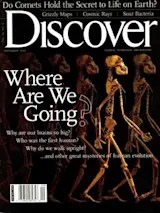Monogamy may be a virtue for people, but it's a fast track to extinction for other large mammals, says biologist Justin Brashares of the University of British Columbia. He examined 30 years of monthly censuses for 41 mammal species on six separate Ghanaian wildlife reserves, analyzing them for factors that increased the likelihood of local extinctions. Loyal mating behavior ranked second, behind isolation of animal populations, as a death sentence for primates, ungulates, and large carnivores.
The study is the first to identify a link between mammal mating behavior and extinction patterns. "It's a pretty striking correlation. Baboons live in large harems, and there's a robust population now, even though it had dwindled in the 1970s. Meanwhile, the more monogamous colobus monkey has gone downhill," Brashares says. "Likewise, you'd think that wild dogs, which form pair-led packs like wolves, would fare better than lions, which require more food but form ...














